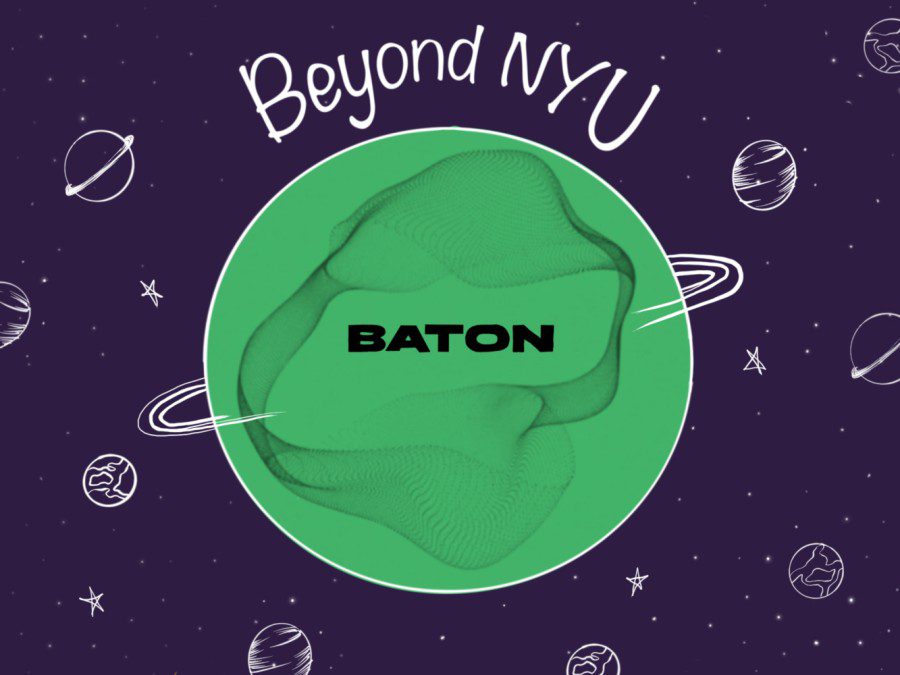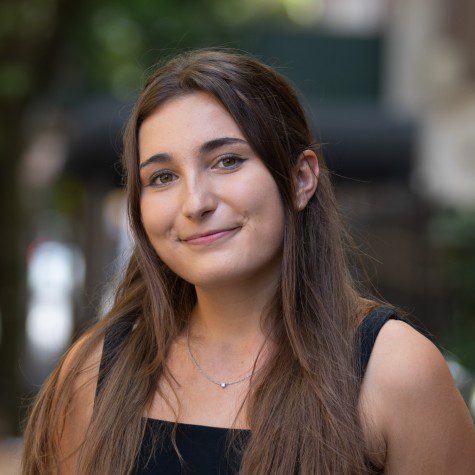Beyond NYU: Empowering creators to safely share their work
Each week, WSN sits down with an NYU student, faculty member or alum who’s making change beyond NYU. Tisch graduate student Gabe Warshaw shares how his startup, Baton, makes sharing artists’ intellectual property more accessible and secure.
(Illustration by Aaliya Luthra)
October 7, 2022
Gabe Warshaw grew up in the East Village and immersed himself in the neighborhood’s rich jazz music scene at a very young age. He started playing the drums when he was four years old and studied music throughout his schooling, attending the Lincoln Center’s Middle School Jazz Academy and the Manhattan School of Music’s pre-college program.
In 2019, he opened his own studio in downtown Brooklyn, where he collaborates with other musicians and producers — and where the idea for Baton was born. Warshaw, a Tisch graduate student in the school’s Interactive Telecommunications Program, founded Baton to address problems he saw across the music industry. Warshaw and his team want to make the sharing of recorded material more secure between artists and producers in the music industry and beyond.
In an interview with WSN, Warshaw spoke more about his background in the music industry, discussed how Baton protects artists’ work and explained why his startup has already gained support from several Grammy-winning producers.
This interview has been edited for length and clarity.
WSN: How did the idea for Baton come about?
Warshaw: The impetus for Baton was that over and over again, I was having sessions with super talented friends of mine, producers, and artists. They would come to the studio and I would hear these insane libraries of material that were just living on their hard drives — unfinished, unused, unreleased stuff that, for one reason or another, were just collecting dust on hard drives. Maybe they hadn’t been released because somebody was too busy or they didn’t quite believe in the idea the same amount that they used to, or just didn’t think it was that good or a million and one other reasons. But to me, those ideas were incredible.
A lot of these people were super accomplished — some of them were touring musicians, even some people who had been nominated for Grammys, and at the same time, a lot of these people are really struggling to get by. They’re worried about rent, they’re not living in mansions in the Hollywood Hills by any means. Those two things were really incompatible in my mind. You’ve got all this amazing work that you’ve done and material that you’re sitting on, it’s super high quality, and still, you’re not really sure where your rent money is coming from.
Warshaw created his startup to address the millions of dollars of black box royalties that are left unpaid each year, artists who have their content reused and released without their permission or compensation, and managers who negotiate deals without equal contribution by all parties. He said that these problems usually take a lot of effort to solve and rarely lead to fair resolutions.
WSN: How did you try to solve that problem?
Warshaw: I started thinking about a way to facilitate collaboration, incentivize sharing and help people get over the hurdle to know that the work that they’ve done has a lot of value. In thinking about ways to accomplish that — to help people get their stuff out into the world and help find a home for those ideas — I had a lot of conversations with not just artists and producers, but also managers and label people and people at publishing companies, and began to unearth a number of pretty critical infrastructural problems that exist throughout the music industry.
All of these problems were amalgamating into this solution in my head that provides a way for people to collaborate and exchange material without the risk of stolen IP, and make sure that everyone gets credited properly throughout that process. And then ultimately make sure that everyone gets paid properly for the work that they’ve done.
Baton won the grand prize for tech venture at NYU’s 2021-22 Entrepreneurs Challenge, which is awarded to ventures that address new problems with unique ideas. The startup’s team was also selected to present at the 2022 NYU-Yale Pitchoff, an annual event where three teams from both universities pitch their ideas and one is chosen as the winner by the audience.
WSN: What kind of services does Baton currently provide?
Warshaw: Right now, people kind of live in a black box. They send something out over text message, Google Drive, Dropbox or WeTransfer, and they don’t really know what happens to that material once it’s been sent out. So, the first thing we built is a tool that allows people to see what exactly happens to their material when they share it with collaborators. On the other end of that, we also built a better kind of submission portal for people to receive collaboration requests from collaborators. The material that they’re receiving has information baked into it that allows people to better organize that material, credit people more easily and get in touch with those people. What people are receiving now contains really critical metadata that allows them to more easily use the material and then ultimately clear those samples and credit the people who sent it to them.
Warshaw met his current business partners, Sami Forzinetti and Claire Bogle, after being offered a publishing deal at a company that Forzinetti was starting. Forzinetti and Bogle joined forces with Warshaw and have helped to propel the service toward success.
WSN: What do you envision for the future of Baton?
Warshaw: What we see this becoming is a comprehensive, mixed media collaboration and rights management ecosystem that allows people — not just in music, but in visual art, fashion, film, coding and beyond — to freely exchange material within an ecosystem that empowers them to know that their material is going to be protected, their work is going to be valued and they’re going to be credited and compensated properly for their work. The goal of this entire thing was prompted by me wanting more of the awesome material that I knew existed on people’s hard drives, but hadn’t been heard or wasn’t going to be heard, to be released and shared with the world. If we can provide a mechanism that supports that and makes it easier for people, then that’s hopefully a net positive for the world.
WSN: How has Baton gained so much support in so little time?
Warshaw: It’s a very easy mission for people to get behind. For anyone who’s trying to make a living off of their art and share it with the world on their terms, there’s not a big leap required for people to understand how Baton is empowering to them. People are really excited about the community features that we have rolling out down the line, and understand that we’re fundamentally oriented around supporting creative processes for people who are really doing this at a high level and building infrastructure that integrates nicely with how people work in real life. We’re not asking them to do a 180 and do something completely different. This is meant to be entirely complementary to existing systems that don’t necessarily work that well all the time.
Warshaw said that Baton is looking for musicians, artists, producers and creators of all kinds to test the platform, and the company is fundraising for a seed round this fall. He added that while only invited artists can currently use Baton, it plans to expand its network soon and that more features for artist collaboration will be added in the next few months.
If you know an NYU student, faculty member or alum who’s making change beyond NYU, contact [email protected].
Contact Abby Wilson at [email protected].


























































































































































